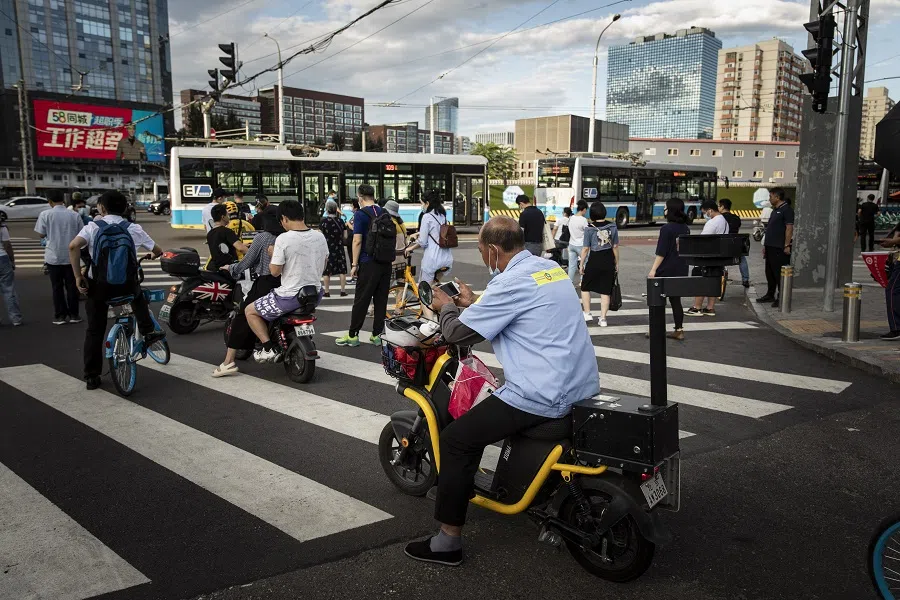China's internet giants are shelling out money for 'common prosperity'. But is that enough?
Heightened gestures of corporate social responsibility and outright donations from major companies have been declared since the Chinese government's recent push for "common prosperity". Are these simply knee-jerk reactions to the government's stance? Can companies be encouraged to be more socially responsible in the long term? China is all abuzz with talk on ways to achieve common prosperity.

After "common prosperity" was elevated to unprecedented importance at the latest meeting of the Chinese Communist Party (CPC)'s Central Committee for Finance and Economic Affairs, private enterprises such as Tencent, Pinduoduo and Meituan, have divided public opinion with their responses to the government's call.
At its most recent earnings call on 30 August, Meituan CEO, Wang Xing said that "common prosperity" is part of his company's DNA because the Chinese characters of its name stand for "better together" (美团).
Many netizens were unconvinced by Wang's remarks and felt that he was trying too hard to dance to the government's beat. Some comments made by netizens include "it seems rather meaningless for him to come out and explain his company's name this way" and "Meituan is flying the red flag now after being hammered (by the government)".
Using Wang's method, a netizen also sarcastically commented that "'Mei' stands for 'America' ('Meiguo' in Chinese) and 'Tuan' stands for 'Team' ('Tuandui' in Chinese), so Meituan stands for 'Team America'." Many netizens urged the company to take concrete action to help achieve common prosperity instead.
"They are doing it to save their own skin" - Chinese netizen

In comparison, the responses offered by Pinduoduo and Tencent were more practical.
On 24 August, after Pinduoduo announced its first profitable quarter since its listing, it pledged to invest a total of 10 billion RMB (approximately S$2 billion) from current and future profits into agricultural development.
Pinduoduo CEO, Chen Lei, shared that agriculture and agricultural products are an integral part of our daily lives. At the same time, agriculture is also a sector in which the digitalisation rates are relatively low, so Pinduoduo wishes to contribute towards modernising farming and revitalising villages through the use of technology with its new initiative.
Chen also said, "While our pledge will substantially affect shareholders' earnings in the short term, it paves the way for our long-term development, and our board of directors has given the green light."
"This is how large enterprises should behave after becoming successful, by helping those lagging behind improve so as to achieve common prosperity" - Chinese netizen
The day after the CPC's Central Committee for Finance and Economic Affairs met, tech titan Tencent announced that it would be setting aside 50 billion RMB for its new common prosperity initiative. Prior to this, the company announced its financial results for the second quarter of 2021. Even though it was the company's lowest earnings growth quarter on record, it went ahead to announce the initiative and do its part for common prosperity.
For companies that have taken concrete actions, even though they still faced jibes like "they are doing it to save their own skin", public opinion towards them is generally more cordial, with comments such as "this is how large enterprises should behave after becoming successful, by helping those lagging behind improve so as to achieve common prosperity", and "hopefully, more [companies] in the industry will try to surpass Tencent's efforts".

It is also noteworthy that both Pinduoduo and Tencent rarely mentioned the phrase "public welfare" in these announcements.
A commentary published on www.21jingji.com (《21世纪经济报道》), a Chinese financial media website, pointed out that Tencent's actions go beyond the usual definition of public welfare and are not about donating money to charity. In fact, what the company intends to do is more akin to teaching others how to fish rather than giving fish away. Tencent plans to invest its funds and digital technical expertise in revitalising villages, increasing the incomes of the lowly paid, improving grassroots healthcare systems, and ensuring the balanced development of education. These are precisely the areas that need a helping hand from those who have succeeded.
...it is an investment made with long-term targets in mind. - Chinese media commentary on Tencent's plans for "common prosperity"
The commentary noted that Tencent will also stand to benefit from its outlay, so its actions are neither for charity nor public welfare. It is also not about short-term self-preservation, instead, it is an investment made with long-term targets in mind. An internet giant making use of technology to do good and generate benefits for the public is a positive transformation on the whole.
Are tycoons donating money to avert trouble?
Other than investing in areas that can benefit those who are lagging behind, Chinese businessmen are also donating to charities.
Based on figures compiled by Bloomberg, seven Chinese tycoons have donated a total of US$5 billion to charitable organisations thus far this year, setting a record. The sum is 20% higher than the national total of donations made in the whole of 2020 and indicates clear support for the government's big push towards common prosperity.

At the CPC's Central Committee for Finance and Economic Affairs meeting on 17 August, the idea of the "third distribution" (第三次分配) of wealth was also thrust into public view. The need to "come up with a basic system to coordinate initial distribution, redistribution and third distribution" was also mentioned at the said meeting.
According to www.ce.cn (《中国经济网》), the renowned economist Professor Li Yining of Peking University put forth the idea of a third distribution in 1994. According to him, initial distribution is the distribution of income by market forces, while redistribution is carried out by the government. As for the voluntary donation of disposable incomes by individuals either out of habit or under the influence of morals, this can be termed third distribution.
Third distribution was subsequently mentioned at both the Fourth (2019) and Fifth (2020) Plenary Session of the 19th Central Committee of the CPC. Third distribution emphasises the voluntary nature of donations made by individuals out of their disposable incomes, but what does "voluntary" mean? Are businessmen and the rich who rush to donate money after the government makes its stance known acting on their own accord? Or are they donating money for their safety or under pressure? There are no clear-cut answers to such questions.
In an interview conducted in August, Professor Yao Yang, dean of the National School of Development (NSD) of Peking University, opined that for enterprises, supporting the government's common prosperity ideal goes beyond donating money for peace of mind. It would be an unfortunate development if that were the case, as it would mean that the government must mandate before companies donate. As dean of the NSD, Professor Yao's views are deemed to represent that of the Chinese government.
Instead of donating big sums, it would be better if companies remove the 996 work schedule so that employees can rest on weekends, or if delivery personnel receive social security contributions from the relevant companies. - Professor Yao Yang, Dean of the National School of Development (NSD), Peking University

Professor Yao also pointed out that it would be better for companies to shoulder more social responsibility rather than donating huge sums. He said that the 996 work schedule is a huge problem and a corporate social responsibility because it diminishes social well-being and makes everyone nervous. Instead of donating big sums, it would be better if companies remove the 996 work schedule so that employees can rest on weekends, or if delivery personnel receive social security contributions from the relevant companies.
Another example given by Professor Yao was that companies should also refrain from using algorithms and systems to monitor how their delivery personnel perform. While doing so would make such personnel complete their tasks faster, it would also tire them, and society pays the price. As delivery personnel go about their jobs with scant regard for traffic regulations, the social environment deteriorates, and this is not something that can be easily salvaged through donations alone. Being a socially responsible company matters much more than giving donations.
Corporate social responsibility
On the topic of corporate social responsibility, Professor Yao said that businessmen create wealth for society and bring about progress. Platform giants need to move away from being solely driven by profit towards "symbiosis" i.e., to be able to see the bigger picture of maintaining symbiosis in the ecosystem they reside in with their partners and competitors, instead of being self-centred as this can lead to damaging social outcomes.
National Business Daily (《每日经济新闻》) also published an opinion piece on the need for companies to switch from a "shareholders-first" to a "society-first" mindset when it comes to fulfilling their social obligations and make maximising the wealth of society their long-term development goals. Companies would also do well to focus more on how to benefit others and less on self-benefits, and to start counting resource-poor segments of society amongst their stakeholders.
Common prosperity has an important role to play in proving the superiority of socialism. Finding the ideal could form the centrepiece of the CPC's work in the next 100 years. - National Business Daily

The same article also suggested that the government make corporate philanthropy less utilitarian, reduce its interference in corporate philanthropy, and encourage individuals and organisations to donate purely for the sake of benefiting others.
Common prosperity has an important role to play in proving the superiority of socialism, and some analysts feel that the ideal could form the centrepiece of the CPC's work in the next 100 years.
But, as for how to achieve common prosperity, the details are still lacking now. Relying only on donations from the rich and corporate social responsibility may not be enough to divide the economic pie properly. In fact, doing so may even cool the enthusiasm of businessmen. It seems like reasonable wealth-distribution tools, such as inheritance and gift taxes also have roles to play.
Related: A new paradigm needed: China cannot achieve 'common prosperity' with Marxism and class struggle | Why China is embarking on the journey of 'common prosperity' | What the Chinese government wants to tell Alibaba and China's tech giants [Part II] | Can China succeed in income distribution reform and get rid of its celebrity economy?





